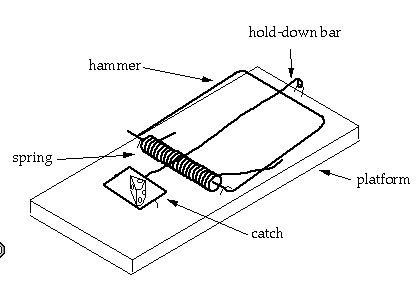There is also a distinct difference between a theory and a law. So please, just take the 10 seconds needed to verify statements like this before trying to play them off as actual information.
Touche. That statement of mine was rash. I apologise for that.
Much more than a God creating earth in 7 days...
The idea of the seven days has been debated, as to an infinite creator, time would be irrelevant.
So anyway, lets look at mousetraps. (Note: Any comments about mousetraps not being alive or whatnot are just silly...its an EXAMPLE!!)
A simple mousetrap is known as
irreducibly complex. This means that it has a number of different parts which work together to accomplish a task and that if you were to remove one of the parts it, it would no longer work.

(image of a mousetrap)
So, if we look at the mousetrap, we can see that if we took any one of those parts away, we would be left with an unworkable machine.
Another example of an irreducibly complex machine is a single living cell. You cannot take any organelle out of a cell for it to continue working normally. For example, if someone were to remove the mitochondria from a cell, it would die as it would be unable to produce chemical energy for itself.
Now, the point that I am trying to make here is that Darwin himself stated in the
Origin of Species:
"If it could be demonstrated that any complex organ existed which could not possible have been formed by numerous, successive, slight modifications, my theory would absolutely break down."
If we take this statement and apply it to the mousetrap, we can imagine that maybe to begin with there was just a platform, which then evolved into a platform with a hammer, and so on.
However, Darwin's theory of Natural Selection says that the systems that work the best are that which work the best (
more...). So simply, the frog which had the longest and stickiest tongue would catch more flies and then survive longer than a frog with a short tongue, then would reproduce and pass this trait on to its descendants.
However, why then would the platform of a mousetrap evolve as it does not work the best for catching mice.
Therefore, a simple cell cannot be the product of evolution, as if it didn't have all of the parts that it needed to survive it would, to say the least, 'bite the evolutionary dust.'
And, before you say anything else, cells are way too complex for them to have come together by random means.
So then how did cells come about? Does not even this small example point towards an intelligent creator?
(Gah...there better not be a rule 34 of mousetraps *shudder* =P)